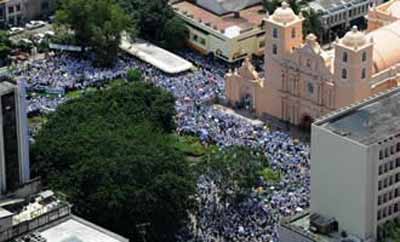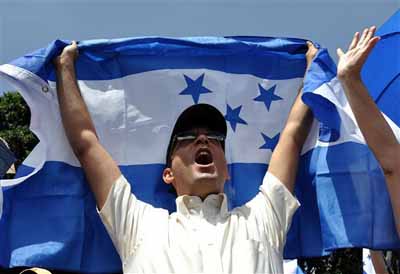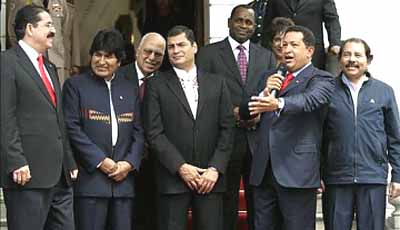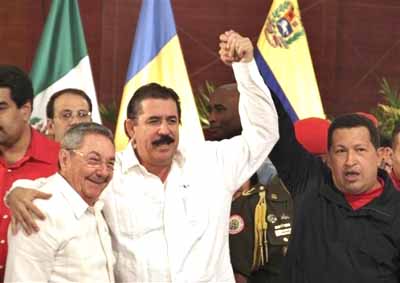 |
International Affairs
The Honduras Impeachment
Emilio Martínez, Bolivia
Would the United States have accepted foreign sympathizers of Richard Nixon
who would want to reinstall him as president?
Perhaps those who rush to qualify the recent political events in Honduras as a coup d’État should remember the case of Richard Nixon, who was removed from his office after the American Congress initiated a process brought on by the Watergate scandal.
For those who don’t know or don’t recall the episode, let me summarize it. On June 17, 1972, five men were arrested after secretly entering the Democratic National Committee offices to steal documents and bug phones.
A later investigation proved that those “plumbers,” as they became known, were part of a political espionage team linked to President Nixon, who was seeking strategic information against his opponents during an electoral campaign, That investigation opened the way to a process against the American President called impeachment, a word that means an impediment or political obstruction, even though its original meaning is to flush, to redden. This figure of speech in Anglo-Saxon law was born in the 14th century when the English Parliament accused the King of squandering public money and shamed him, causing him to redden.
A head of State challenged by impeachment must face a vote of Congress that can cause him to lose his office.
In U.S. history, three presidents have submitted to this process: Andrew Johnson (1868), the mentioned Richard Nixon (1972) and Bill Clinton (1998-1999), the latter for his scandalous affair with his young secretary Monica Lewinski. Johnson and Clinton were acquitted, but not Nixon - who chose to resign before his imminent deposal by Congress.
The present day situation in Honduras
In Honduras something similar happened. The impeachment process against ex-President José Manuel Zelaya started a week before he was deposed, soon after he triggered an institutional crisis by repeatedly violating the Constitution and challenging judicial decisions issued by the Congress of that Central-American nation.

A huge demonstration on June 30 in Honduras supporting the ouster of Zelaya and new constitutional president Micheletti
 |
Zelaya was already moving toward despotism in 2008 as his relation with Hugo Chavez became closer. He began to execute the methodology of a gradual coup d’État that had already been exported by the Venezuela president to several Latin American republics. This system included persecution of the free media and implementation of an illegal procedure to change the Constitution in order to keep himself in power.
The fuse that set off the crisis was Zelaya’s plan to hold a popular referendum last Sunday, June 28, that called for a vote on the dissolving of Congress and the installation of a Constituent Assembly to allow for his presidential reelection.
Even though the Supreme Electoral Court of Honduras considered the referendum unconstitutional, Zelaya ordered the Army to distribute 15,000 ballot-boxes for the referendum. This order was not obeyed by the military since it violated the sentence of the due authority.
Next, José Manuel Zelaya dismissed the military Commander, General Romeo Vasquez. In response, the Supreme Court commanded Vasquez to be reinstated in his functions and the ballot-boxes to be kept inside the military headquarters. Zelaya counter-ordered his sympathizers to invade the headquarters, take the ballot-boxes and set them up for the referendum.
A multi-party commission named by Congress to investigate the President concluded that Zelaya had violated Honduran law. That commission asked Congress to declare him unfit to govern and begin a legal process of impeachment.
It is necessary to stress that the juridical basis for such an impeachment is in the Honduran Constitution, which establishes in article 239:
“Any citizen who has already served as head of the Executive Branch cannot be President or Vice-President again. Whoever violates this law or proposes its reform, as well as those who support such violation directly or indirectly, must immediately cease in their functions and will be unable to hold any public office for a period of 10 years.”
One sees, therefore, that the Honduran Congress took action to prevent a coup d’État by Zelaya against the democratic institution of the country. It voted unanimously to depose José Manuel Zelaya and named as the new head of country the president of the Congress, Roberto Micheletti, to whom this responsibility normally would fall according to the Constitution. That congressional decision was duly supported by the Supreme Court. This is how Congress carried out the legal impeachment of Zelaya.
Adding to the tense political picture was the fact that, authorized by Zelaya, Venezuelan and Nicaraguan military forces were present in Honduras posted close to the Congress. This means that when the Honduras military took action, they were also proceeding in defense of their sovereignty.

Honduras entered the ALBA group in August 2008. From the left: Zelaya, Morales, Correa, Chavez and Ortega. Below, on June 29 Zelaya embraces Castro in Managua, after being exiled from his country
 |
As expected, this democratic counter-coup against Zelaya caused a hysterical reaction in Hugo Chavez and his allies of ‘21st century Socialism.’ They called for an emergency meeting in their ALBA group - Bolivarian Alternative for Latin America - a new version of the Warsaw Pact. There they offered harbor to their deposed disciple and threatened to invade Honduras to reinstall him in power.
At this meeting, where Presidents Raul Castro (Cuba) and Daniel Ortega (Nicaragua) were present, statements were issued in favor of what those “moral authorities” consider to be democracy in Honduras, that is to say, only under Zelaya’s rule. Consequently, they condemned the decision of the Honduran Congress as a “coup d’État.”
Another quick reaction responding to the alarm sounded by Chavez came from the Secretary General of the American Organization of States (OAS) José Miguel Insulza, who everyone knows owes his position to the diplomatic maneuverings of Hugo Chavez.
What is lamentable is that, in addition to these expected moves of Chavez’ chess pieces, came the unexpected reaction of Barack Obama’s administration and European governments, who expressed incomprehension over the situation in Honduras. Perhaps this is due to manipulation of information or confusion about the present day situation of Latin American governments which is quite different from past epochs.
I conclude with my initial question: Would the United States have accepted the orders of foreign sympathizers of Richard Nixon who would demand that he be reinstated as president?

Posted July 2, 2009
Emilio Martinez, a Uruguayan author and journalist living in Bolivia,
first published this article in Spanish on his blog
Ciudadano X
A site to expose Socialism and Communism

Related Topics of Interest
 Bertone and the Castro's Fraudulent Religious Policy Bertone and the Castro's Fraudulent Religious Policy
 Benedict XVI and Bertone’s Trip to Cuba Benedict XVI and Bertone’s Trip to Cuba
 Fidel's Real Successor Fidel's Real Successor
 Cordial Dialogue between Wolves and Shepherds Cordial Dialogue between Wolves and Shepherds
 The Cuban Fiasco The Cuban Fiasco
 Declaration of Resistance to the Vatican Ostpolitik Declaration of Resistance to the Vatican Ostpolitik

Related Works of Interest
|
|
International Affairs | Hot Topics | Home | Books | CDs | Search | Contact Us | Donate

© 2002- Tradition in Action, Inc. All Rights
Reserved
|
 |
|